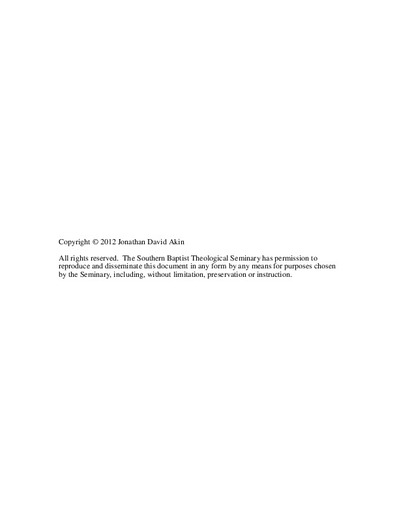| dc.description.abstract | This dissertation investigates whether there is a theme of future hope in Proverbs. Chapter 1 surveys scholarship on this point. Most scholars who believe Proverbs is only concerned with this present world do not read Proverbs in its canonical context. This dissertation argues that in its canonical context the Book of Proverbs functions to explain how Solomon trains the Davidic prince to be the ideal king who through wisdom - living life under the covenant - establishes an eternal, righteous kingdom in the land. The failure of Solomon's sons (the Judahite monarchy) contributes to the future hope for a Son of David who fulfills this picture.
Chapter 2 analyzes debated passages in Proverbs to see if a future hope arises. It argues that there is a future hope for retaining the land (2:1-22), posterity for the Davidic line (24:13-20), and an eternal Davidic Kingdom (29:14).
Chapters 3 through 5 place Proverbs in its canonical context to see if it is connected to the future hope of the Old Testament. Chapter 3 argues that Proverbs presents a similar future hope as that of the Writings, for a Davidic King who is faithful to Torah, defeats Israel's enemies, establishes Israel in the land and sets up an eternal kingdom. Chapter 4 argues that Proverbs connects with the future hope of the Torah for a king, obedience to the law with a new heart, dwelling in the land, and an eternal kingdom. Indeed, Proverbs argues that wisdom is obedience to the Torah. Chapter 5 argues that the failure of the Davidic kings to live up to the ideal of kingship in the Torah and Proverbs led to a future hope in the prophets for a king who embodied wisdom and set up an eternal dynasty.
Chapter 6 concludes that Proverbs does have a future hope for a wise David who will establish an eternal kingdom in the land. The New Testament presents this as ultimately fulfilled in Jesus. | en_US |

